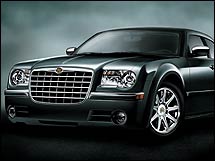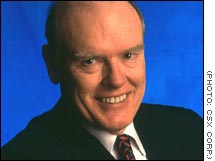A firm advantage in landing ChryslerCerberus' executive depth, connections helped it win a majority stake in the automaker.NEW YORK (Fortune) -- Among the many lessons to be drawn from DaimlerChrysler's decision to sell Chrysler: the private equity firms with the best-connected c-suite executives have the edge in the now common bidding wars for deals. The German automaker hopefully ended nearly a decade of losses by selling an 80 percent stake in the iconic Chrysler to hedge fund Cerberus Capital Management in a deal worth $7.4 billion. The company formerly known as Daimler-Benz paid $37 billion for the U.S. automaker in 1998.
So how did Cerberus beat private equity juggernaut Blackstone, Canadian auto parts maker Magna, and activist investor Kirk Kerkorian for a carmaker that analysts say could be profitable if its cost structure is radically slashed? In the conference call following the announcement, DaimlerChrysler (Charts) seemed to favor the speed and power Cerberus brought to the deal. The firm known on Wall Street as one of the craftiest vulture investment groups around is led by Drexel Burnham Lambert alum Stephen Feinberg and stocked with former distressed debt investors from the same firm. Drexel is infamous for fueling the 1980s buyout mania by popularizing the use of high-risk junk bonds to back M&A transactions. Moreover, Cerberus' head of auto strategy is former Ford (Charts, Fortune 500) executive David Thursfield, and former Chrysler chief operating officer Wolfgang Bernhard advised the deal. "Other people who were formerly with Chrysler were also tapped to help with these negotiations [on behalf of Cerberus]," says Kim Korth, president of automotive research firm IRN. "They didn't get press, but it all helped get the deal on the table. These guys were able to show Cerberus what they could and could not negotiate." Korth adds that it was essential for Cerberus to bring in players familiar with the Daimler management and the unions because the "three-dimensional" negotiation process meant that Cerberus had to have people in the talks that could deal with Daimler management but not scare away labor. Low interest rates around the globe have meant that money is flowing into all asset classes, making it harder to produce outsize returns. The cycle has helped private equity firms and hedge funds, which have famously beat benchmarks such as the S&P 500 by huge margins. Investors from high-net worth individuals to the pension funds of firemen and teachers unions are giving them money to acquire companies that will, hopefully, create huge returns down the road. In the ensuing battle for investment vehicles, Cerberus has managed to best some notable rivals, including stalwarts like KKR (for Albertson's) and now Blackstone. "When Cerberus brought in the people from Chrysler as advisers, they became the devil the unions knew, as opposed to the one they didn't. It established working relationships between the unions that predated Cerberus' interest in Chrysler," says Colin Blaydon, a professor at the Center for Private Equity and Entrepreneurship at Dartmouth's Tuck School of Business. "We're seeing more and more of this in bigger, tougher deals. In order to get the deal done, private equity firms need to bring in players who can convince people who would otherwise oppose the transaction to support the deal." Cerberus is known for having one of the deepest benches of c-suite executives among its buyout peers, including former Vice President Dan Quayle, who is the global chairman. Quayle's many connections in Japan could have something to do with the firm's long and profitable management of the Japanese bank Aozora, and media reports attribute the hedge fund's success in the Air Canada deal to him. A person close to the 275-person firm says that unlike buyout shops who recruit executives for a single job, Cerberus keeps a team of executives covering several industries on hand at all times. "Private equity firms don't do anything for decoration. They're savvy investors and spend their money wisely," says Mort Pierce, chairman of Dewey Ballantine's Mergers and Acquisitions Group. "Working with seasoned executives in the industry is something they all do in one way or another, and we can see that it gives them an advantage in a particular industry if they have the right executive." The strategy seems to have worked for now. UAW President Ron Gettelfinger said in a statement that "(union vice president) General Holiefield and I concluded that the transaction with Cerberus is in the best interest of our membership, the Chrysler Group and Daimler. We are satisfied now that the decision has been made so that our membership and management can focus on designing, engineering and manufacturing the finest quality products for the future success of the Chrysler Group." Bear in mind the UAW was instrumental in upsetting Cerberus' bid for auto parts maker Delphi. "I think someone possessed Ron Gettelfinger. As of two weeks ago, he was still saying that he didn't want Chrysler going to private equity because traditionally all they do is strip and flip the operations," says Brad Rubin, an auto trading specialist at investment bank BNP Paribas. "If he believes that Cerberus isn't going to press for significant concessions he's crazy. There's no way that Chrysler will be able to continue to operate as they have been." Rubin says the UAW will have to make significant healthcare concessions, do something about retirees, cap pension funds and move all future employees to defined contribution plans such as 401(k)s in order to return Chrysler to profitability. The UAW did not return calls for further comment. Buzz Hargrove, head of the Canadian Auto Workers union, is unconvinced by both the UAW statement and whatever it is Cerberus said to woo his U.S. brothers. "I don't have any confidence that they'll be any different than any other private equity group," says Hargrove. "Cerberus has (ex-Treasury Secretary) John Snow and he comes from the Bush administration, which is not exactly a worker friendly administration. Private equity groups traditionally come in and slash and cut and sell leaving a lot of people jobless and families without financial support. There's not much room for comfort there." "I was surprised by the UAW statement, but Gettelfinger is on the supervisory board and has all of the inside information," Hargrove adds. "Cerberus must have had someone who was able to convince him the deal would be in the best interest of his members." Auto industry analysts believe the Cerberus deal could mint money if the firm can do something about labor costs, but history shows that this is easier said than done. The Daimler-Chrysler marriage itself was a neat looking deal that turned out to be a cautionary tale to buyers and sellers at work in this current overheated M&A environment. The high-profile "merger of equals" was supposed to create a multinational auto king able to compete in nearly every segment of the market with its Mercedes, Jeep and Dodge brands. Instead, the acquisition failed in large part because Daimler was unable to get union cooperation. While the UAW seems to have rolled over and Cerberus seems triumphant, IRN's Korth says the story is not over. "There is going to be increased volatility at Chrysler and there is some likelihood that there will be a strike," she says. "With this deal Chrysler (and by ownership Cerberus) assumes the negotiation of pension liabilities and there are still $19 billion in pension costs out there." |
|


